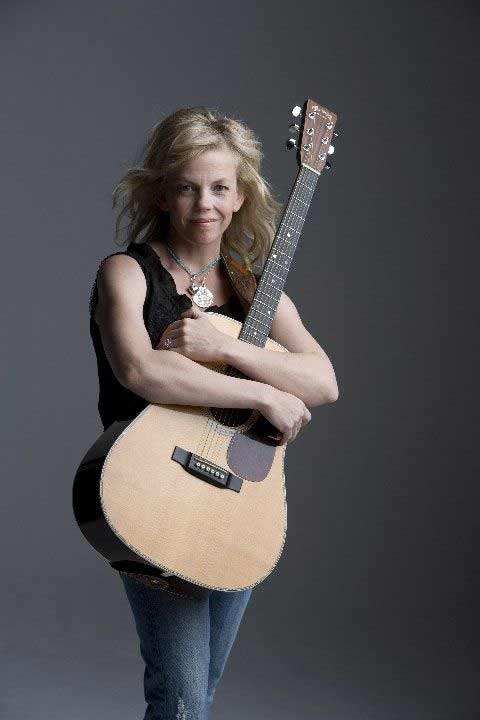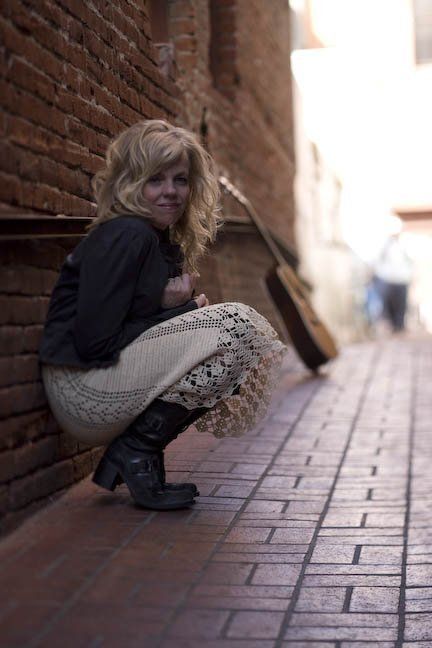Altered Priorities
Brigitte DeMeyer, Mother and Songwriter, Couldn't Be Happier
By David McGee
Brigitte DeMeyer: 'I'm a singer and a writer. That's what I do. So I wanted people to be able to hear the vocals more. And to hear what I was saying.'
Just because Brigitte DeMeyer is pictured on the cover of her new album standing in front of stained glass windows with her head bowed, don't go thinking Red River Flower, the album in question, is, you know, churchy.
"Everyone is confusing this record with being a religious record," the comely Ms. DeMeyer said with some mild exasperation one sunny Saturday on the phone from Nashville. Apparently, because of a couple of songs titled "Shepherd" and "Looking for Moses," and the cover image, word was afoot that she'd gone for the gospel gusto. In fact, DeMeyer and her songs evince a strong sense of spirituality, of connection to the natural world and a higher power, but those attributes are more subtly expressed in her language, which can suddenly morph from fundamental, if colorfully rendered, King's English into Biblically inspired or old English phrasings. Yet, "because of those two songs, and me on the cover of the record looking like I'm in a church, bowed forward..."
Yes, she is standing in a building with stained glass windows that has a long history as a place of worship. It's in Music City, and it was built at the turn of the 20th century as, indeed, a Gothic Revival greystone church, located in what is now the heart of what's left of Music Row. But it's no longer a church, and hasn't been one for a long time. For the past decade and a half, renovated and reconfigured, it's been one of Nashville's busiest and most famous recording facilities, Ocean Way Nashville Recording Studios, the southern counterpart to a like-named Los Angeles facility of high repute. And it was to Ocean Way the DeMeyer, her favorite producer Brady Blade, and an all-star band retired to for the sessions that yielded Red River Flower.
"That's the studio where I recorded the record," she points out. "It used to be a church. Love stained glass! Thomas Petillo, a photographer, came and took a bunch of Polaroids of us and I loved how natural they were, so I put them on the album. And all these people are asking me, 'Is this a church record?
"Well, it depends on what you mean by that."
Ah, do tell. As always, DeMeyer is working in a variety of styles, all in a southern flavor, with country being predominant. The album opener, "Looking For Moses," is a cool, jazzy, finger-popping exercise with a rippling B3 undercurrent and rich, twangy electric guitar punctuations. "Without You" breaks fast out of the gate in a rockabilly strut, all twang and doghouse bass, as DeMeyer surveys the fallout from a busted romance (with Buddy Miller adding background vocals); "Wicked to Win," with DeMeyer's voice processed to sound like she's singing through a megaphone, is, in her own description, "a swamp grind" of snarling guitar and stomping rhythm. The beautiful, aching ballad, "Bird," is a stone, traditional country heartbreaker, stark, still and chilling, followed by "Shepherd," a gently rocking, Emmylou Harris-styled shuffle. "Justice" heads off into funky, southern soul territory, aided and abetted by Regina McCrary and Gayle Mayes joining DeMeyer in sisterly harmony of Staples extraction; the shimmering guitar and muted, seething ambiance of "All You've Got To Lose" recall some of Daniel Lanois's eerie excursions into the dark side of human nature (Lanois played on DeMeyer's 2006 Blade-produced Something After All, and it appears his influence lingers on); despite the country strains provided by pedal steel, "Running On You" feels closer to blue-eyed soul, thanks to DeMeyer's sultry vocal, Mike Henderson's snarling electric guitar lines, and Phil Madeira's robust organ support. "Meant for Mine" is, simple and beautiful, a love benediction straight out of the country, all gentle rhythm, crying pedal steel, softly strummed acoustic guitar, and Buddy Miller adding his own nuanced harmony to DeMeyer's tender, whispered sweet nothings. From an austere vocal-and-guitar opening, the laconic lament, "An Old Song," takes on western trappings when the pedal steel enters weeping. And just as the album opened in jazz territory, so does it close there, with the gently bopping "When I'm Gone," thanks mostly to Madeira's bright, right-hand Jimmy McGriff-style B3 noodlings and a tight rhythm section keeping the affair propulsive in a low-key way.
'I'm moving into a whole other thing now. Becoming a parent changes a lot. Changes your life as a musician; your priorities are altered.'Multiple story lines surface in discussing Red River Flower with DeMeyer—sonically it's her most engaging album ever, with the music having such immediacy and presence it sounds like the players and the listener are in a room together; and the band itself, hand picked by Blade and DeMeyer to be a kind of rootsy dream team, plays with laudable chemistry and restraint—but most important is what the material says about DeMeyer herself. Long one of Nashville's most respected songwriters, she's elevated her game on this outing, with lyrics more direct and personal, but also more consciously literate, than ever before. And, as mentioned above, she's more given here to examining how people are connected spiritually in relationships, and more sanguine about those with whom it didn't work out—an absence of malice, if you will.
"I never meant any malice towards anyone ever, but venting always helps," DeMeyer says with a knowing laugh when this idea is trotted out for her appraisal. But there is something different at work in her personal dynamic this time, she adds.
"Well, a lot happened between the last album and this one. One, I became a mother, and if that isn't a spiritual awakening I don't know what is. So people think the album is religious, but to me it's more...like the song 'Shepherd.' Here I am this musician my whole life and you have a baby, a shepherd is akin to being a mother, so I wrote that. Then 'Meant For Mine,' the duet with Buddy Miller, that's me rocking my baby and looking at him going, 'Oh, my God.' It was sort of inspirational for a lot of songs. It made me very reflective. And also, I'm in a place in my life now where I'm really happy and at peace with a lot of stuff. My husband always teases me, 'You're not gonna write any more good songs because you're too happy!' The old adage is, never piss off a songwriter, because that's where all their songs come from. Poor me, you hurt me, blah-blah-blah. This is more like observing relationships. I'm just in a different place right now, and those are the songs that came out. Which were written two years ago. I'm moving into a whole other thing now. Becoming a parent changes a lot. Changes your life as a musician; your priorities are altered."
Her son, Jeremiah, now three, was born after DeMeyer had completed her Something After All album. He travels with his mother when she hits the road, a "total road dog," as she says.
"I'm lucky that I have a lot of support. He's my number one priority, obviously, he's everything. But now I just travel with a lot more people. Bring a nanny with me; I write when I have time; I have a lot of support and believers in what I do, and I'm lucky with that. My approach is to make sure he's happy and healthy and safe and exposed to interesting things. I have an apartment in Nashville where I do a lot of work now and I can keep his toys here. I just make it work, and my husband's really, really supportive."
Wife, husband and young son also have a home in California, near San Francisco, but DeMeyer considers Nashville to be "home away from home," a place she never tires of visiting for extended periods of time. "I just love it here. I was paying so much in hotel bills I thought, You know what, I'm here every month, I'm just going to get a place. It's very affordable and relaxed. My son loves it, my husband loves it and we come here as much as we can. It's a nice place to work. The cost of living here compared to California..." Her voice trails off, having pretty much obviated the need to comment further on housing cost comparisons.
Besides her husband and son, the other key man in DeMeyer's life is producer Blade, whom DeMeyer met when he was drumming in Emmylou Harris's Spyboy band. His "sparse" style was what she was looking for, so she tracked him down, and found the chemistry was there from the start.
Asked what Blade brings to the party that's so valuable to her studio efforts, DeMeyer has an immediate response: "We understand each other; we're very comfortable with each other; he's introduced me to a lot of musicians who have subsequently become good friends of mine, like Buddy Miller, Chris Donahue, Al Perkins—he introduced me to everybody. But I'd say he understands the sound I like—he's from the south, he's from Shreveport, Louisiana. He knows that even though I live in California, my heart musically is southern tinged. It's in his blood, so he knows how to create that sound that I describe to him. He knows how to help me get that, and he listens to me. And he brings in players that provide that. I mean, who's better than Buddy Miller? And Mike Henderson, who's like this silent storm? He comes in and he plays that baritone. On 'Looking For Moses,' I told Mike I wanted a vintage, acoustic sound like we're on someone's back porch or in their living room. Warm. So he pulled out this baritone guitar and played the solo on 'Looking For Moses.' At the end of the session he said, 'I played with a lot of people, and it's really a privilege to play with someone who can actually write.' That made my year."
That "warm" and "vintage" sound suffuses Red River Flower with an immediacy and presence absent from the artist's earlier albums. Exactly, DeMeyer says, because it was recorded live, with no overdubs, all the musicians in a circle around a single mic, bluegrass style. So with Blade not only producing but playing drums, percussion and acoustic guitar; Henderson; Miller; Madeira; Donahue; and another of her all-time favorites, Al Perkins, playing pedal and lap steel and dobro (she's now touring Europe as part of Perkins's band), DeMeyer went at it. "It's more sparse, which is what I wanted because, first, you can hear the lyric and the message more clearly. And second, you can hear my vocals more clearly, and that's what I live to do—I'm a singer. I play my guitar, and people say I'm good on guitar, but I'm a singer and a writer. That's what I do. So I wanted people to be able to hear the vocals more. And to hear what I was saying."
Of her Brady Blade-produced new album, Red River Flower, DeMeyer says: 'I feel like it's closer to the sound I've always wanted, it's closer to my heart. I'm really proud of the lyrics and I'm proud of all the musicians and their performances . I can't believe they worked with me. I'm just so humbled by everyone's talent and their spirits.'What the listener hears is said directly but on occasion in a voice filigreed with antiquity: "Lead me to the table/Where your wisdom I may find" ("Shepherd"); "How the minutes run aground/Reckless and yet tender found/Days beloved we're endowed/Disappear without a sound" ("A Moment's Refugee"); "Of all the eyes yet to behold you/May ours intertwine/Of all the arms meant to enfold you/You were meant for mine" ("Meant For Mine"). Such verses add gravitas to these songs, focusing a listener's attention more sharply on the story because the language gives the emotions an outsized grandeur, makes it seem as if something more is at stake when DeMeyer forsakes her otherwise plainspoken, terse poetry.
"On my previous record, the song I recorded with Buddy Miller, 'By and By,' was my stab at old prose, like Shakespearean," she explains of the evolution of this strain of her writing. "I love that old kind of writing and that old language. I think it's poetic. To me that language is deep. It's painterly, it paints the feeling. When I use that kind of language it makes you feel the feeling deeper. 'Days beloved we're endowed'—it makes you think about what I'm saying, instead of me saying, 'We don't have enough time. There aren't enough days in the week.' It's like painting. It's like you use certain oils. It's more thought provoking, that language. It conveys the depth of my feeling when I'm writing a song."
In the end, the writing, the music, the production approach and the recording strategy merged seamlessly to produce the beauty that is Red River Flower. Her response to a comment about how she seems to have hit her mark precisely on this album is indicative of how close she feels to this new music. No effusive, boilerplate kudos for anyone from her, but rather a subdued, thoughtful reflection redolent with gratitude and humility, in recognition of a collective effort to realize an individual vision.
"You know, when you're doing what you love you get kind of a high, a spiritual high, and I think everyone understood that. Everyone was connected. And I think it's conveyed on the record. You feel like family when you're making something that feels that good. It's all about chemistry—I've played with other people that I've never spoken to again. I'm happy for them and God bless them, but I want to stay with these people and keep working with them, like Brady, because the vibe was so nice. So yes, I'm proud of the record and proud of the people who stepped forward to participate, I'm really proud of the lyrics."
On the title song of her second album, Nothing Comes Free, DeMeyer announced, "The pursuit of happiness is what I'm here for." Still operative, is it?
"Yeah!" she exclaims with a hearty laugh. "I'm way happier than I was when I recorded that. I'm still pursuing it! Pursuing the continuation of happiness!"
THE BLUEGRASS SPECIAL
Founder/Publisher/Editor: David McGee
Contributing Editors: Billy Altman, Derk Richardson
Logo Design: John Mendelsohn (www.johnmendelsohn.com)
Website Design: Kieran McGee (www.kieranmcgee.com)
Staff Photographers: Audrey Harrod (Louisville, KY; www.flickr.com/audreyharrod), Alicia Zappier (New York)
E-mail: thebluegrassspecial@gmail.com
Mailing Address: David McGee, 201 W. 85 St.—5B, New York, NY 10024
Founder/Publisher/Editor: David McGee
Contributing Editors: Billy Altman, Derk Richardson
Logo Design: John Mendelsohn (www.johnmendelsohn.com)
Website Design: Kieran McGee (www.kieranmcgee.com)
Staff Photographers: Audrey Harrod (Louisville, KY; www.flickr.com/audreyharrod), Alicia Zappier (New York)
E-mail: thebluegrassspecial@gmail.com
Mailing Address: David McGee, 201 W. 85 St.—5B, New York, NY 10024



